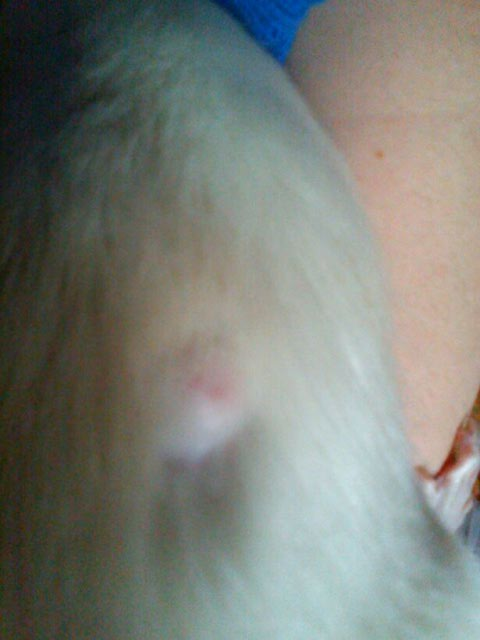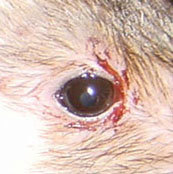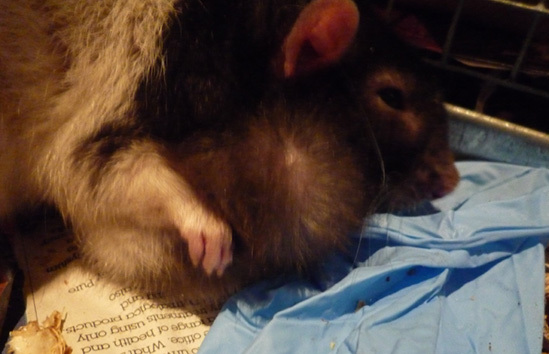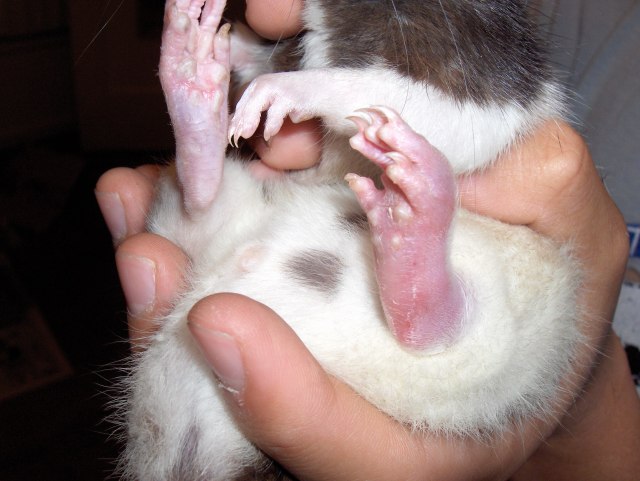QuestionI was just told that my pet rat has a bladder stone. My vet didn't seem very worried - he found it by accident while looking at an x-ray of her for something else (that turned out fine). He said it could be too much calcium, but he didn't know if KT Lab Logs would have too much. He said to watch out for tan or pink in her urine. I asked if she'd start to squeak or something if it turned painful and he thought so....he is an exotic vet too. But I am still unclear what this means for her. Are bladder stones different from kidney stones? Can - or will - this cause her a blockage? Can anything be done now, or do I just wait to see if she gets sick? She is acting fine right now - eating, drinking, running around, wrestling with her brother. BUT...I did notice slightly pinkish urine on the bedding once a little while back - but it was so very very lightly pink that I wondered if it had always been that way and I'd missed it before.
Thank you so much for your time.
A.
AnswerHi there
Not only do you have to worry about seeing blood tinged urine, but you need to also be prepared for the following:
Difficulty urinating
Foul odor
Distended bladder
Hematuria (blood in urine) as discussed above and/or cloudy urine
Problems urinating or total lack of urination.
Licking or biting at genitals which indicates pain.
No interest in food and water which can lead to Dehydration.
Lethargic
hunched posture with puffed fur
Your rat has a bladder stone. This is like a kidney stone and is very painful when it starts to travel. It can cause total blockage and this can become a life threatening emergency.
Is your vet a board certified avian/exotic vet and in an all exotic clinic (exotic/avian only, not dogs/cats.
These stones are usually Struvite, which is made up of magnesium ammonium phosphate and more common than any other kind.
Diet can play a role in the development of these stones and KayTee diet, anything by this company, is not a good choice for foods. They are too high in proteins (should not exceed 15% ideally) and this food is over 20% proteins along with alfalfa that rats cannot properly digest, and Ground Yellow Corn as the first ingredient it not good, as this is from the hard yellow corn kernels found in the seed mixes that are known to be carcinogenic. In short, Kaytee is not the best on the market to feed the ratties.
Anyhow, the reason I ask about your vet is because since I have been working with rats and shadowing in the footsteps of various exotic clinics, I have found out that 70% of the vets that say they see exotics are not board certified exotic specialists but are instead general DVMs with an interest in exotics. Out of those 70%, about 15% have the proper medications on hand and the proper small scale equipment to do procedures safely on them. Also out of those 70%, only 10% have the ability to care for critically ill rats and are able to provide them an enclosure that oxygen is piped in when a rat has a bad respiratory infection. Out of that percentage, at least 3% of them never saw a rat boggle their eyes or brux and at least 2% would probably say the rat has a brain disorder or something wrong with her nervous system if he saw her brux. The other 10% would say something was wrong with the eyes. Yes this is true stuff. Out of those 70%, only 25% of these vets knew what porphyrin was and that it was produced by a gland behind the rats eyes. Only a handful know the name of the gland was harderian gland. I can go on and on. What I am simply saying is that because your vet did not seem to be real concerned about this stone and his answer to your question about this being painful enough to make your rat squeak his answer was he thinks so, but yet you walked away with tons upon tons of questions about this with no answers from this vet. In fact, I am only hoping this thing never moves an inch so you dont have to face a critical moment racing against the clock to get her to the vet in order to hav the stone removed. My biggest concern is your vet opted to do nothing about this stone and this is not a good decision.
Your rat has a stone and the first thing that should have been done is to find out WHY she has it. Its it genetic? Is it due to a problem such as diabetes or unbalanced or improper diet or thread worms in the bladder, or too much blood calcium (blood should have been drawn) or simply a bacterial infection. Even though there are no symptoms, its better to nip it in the bud now, like I can almost feel that you are scared and would like this to be addressed and are not understanding why it is being taken so lightly. This is my question as well.
Other conditions that can lead to stone formation due to the retention and stasis of urine are anatomical defects, or pocketing in the bladder wall known as diverticula, and immobility due to stroke and hind limb paralysis.
The thing is, she has a stone, thats a fact. Now, once a stone has been found, treatment should be started ASAP!
Without treatment the stones can cause complete blockage of urine flow. If this occurs, renal failure can develop quickly and this can cause death very very fast.
Treatment depends on the type of stone and the location of the stone. Usually antibiotics are given and this can be the only mode of treatment as sometimes this is all that is needed to dissolve the stone!
If the stone is too big, surgery will need to be done and this is when the question comes up about how well equipped the vet is to handle such a surgery and if they are capable of performing a cystotomy, a urethotomy or a nephrotomy.
If you would like I can either check the creds for your vet or even give you names of other vets to consider, no obligation of course. All I need is your location. You can make the follow up private so nobody can read what we may discuss.
Hopefully I have been able to help you understand the seriousness of this and so you understand this should be addressed further rather than to wait for something to happen.

 rat being attacked by cage mate?
QuestionQUESTION: Hi! I have a female rat named pippin,
rat being attacked by cage mate?
QuestionQUESTION: Hi! I have a female rat named pippin,
 My rat has a lump
Question
Silks lump Silks lump again
I hav
My rat has a lump
Question
Silks lump Silks lump again
I hav
 Bloody eyes in my pet rat...
QuestionMy cousins pet rat is about three years old and
Bloody eyes in my pet rat...
QuestionMy cousins pet rat is about three years old and
 male rat large rapidly growing tumour
Questionhannibal2
QUESTION: better photo is atta
male rat large rapidly growing tumour
Questionhannibal2
QUESTION: better photo is atta
 Pet Rat with edema and possibly diabetes
QuestionQUESTION: Hi,
My pet rats right leg has swollen
Pet Rat with edema and possibly diabetes
QuestionQUESTION: Hi,
My pet rats right leg has swollen